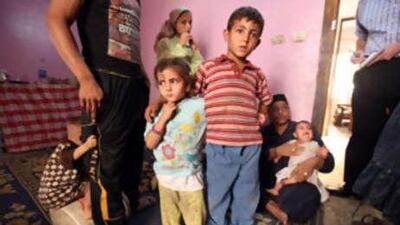CAIRO // Relatives of the victims of a deadly rockslide in 2008 reacted with outrage yesterday after a local court gave what many here consider a light punishment to a high-level municipal official. A criminal court on Wednesday sentenced Mahmoud Yassin, a deputy governor of Cairo governorate, to five years in prison for ignoring warnings that might have saved 119 people who were killed when rocks crushed their homes in the impoverished Duweiqa area of Egypt's capital.
The court ruled that Yassin, along with seven other city officials who were sentenced to three years each, had prior knowledge that the Moqattam Hills above the crowded neighbourhood were at risk of collapse. "I was in court yesterday and I am completely unsatisfied with this verdict," said Fawziya el Tayeb, 60, who lost 10 children and grandchildren in the rock slide. "I want to catch the people who are responsible ... and tear them apart with my teeth."
The incident, which also injured 55 people and destroyed dozens of homes, emerged as a symbolic indictment of the government's negligence toward the slum communities that house as many as 60 per cent of Cairo's residents. "The problem was defined and the solution was planned and no action was done because simply the priority of the government and the priority of the regime was not with the poor people as they always claim it is," said Mamdouh Hamza, a consultant engineer who is active in public housing issues. "Why couldn't they solve the problem? Only 500 people [in the neighbourhood]? Let them die, as far as they're concerned. We have 80 million. I think this is the attitude."
Shortly after the cliff fell in early September 2008, residents could be seen searching through the rubble with their bare hands. Some reported that security officials were more concerned with blocking the media from entering the area than with rescuing victims. "They did nothing," said Olfat Adl, 20, of the local security and emergency response officials. Ms Adl said rescue workers pulled the body of her 27-year-old sister from the rubble 56 days after the rockslide.
"They were just sitting there with umbrellas over their heads, with cigarettes and cold drinks being brought to them. The police major was just sitting there brushing dust off his clothes," she said. The government's response to victims in the two years following the incident was also a source of anger. Though most were resettled in the nearby Suzanne Mubarak Housing Project, some said they should have received financial compensation for the loss of their homes and loved ones.
Official investigations revealed that the accident was probably caused by sewage water that drained from another informal housing development on top of the hill. Those homeowners allowed their waste water to drain directly into the limestone earth, where crevasses in the rocks channelled it toward the edges of the cliff. Sewage treatment chemicals in the water reacted with the calcium in the rock, further weakening the stone, Mr Hamza said.
Mr Hamza echoed the views of many Duweiqa residents that culpability extends beyond the eight officials convicted on Wednesday. Housing authorities have long known about the dangers facing settlements at the base of Moqattam, but their hands were tied by budget constraints, he said. Cairo governorate officials, including Mr Yassin, were unavailable for comment yesterday. "They were absolutely scapegoats for the regime," said Mr Hamza of the eight convicted men. "But at the same time, they were also guilty, but they are not the only who are guilty. I can assure you that the governor of Cairo has made tremendous efforts to solve the problem. But he couldn't because this means a bigger budget, which he hasn't got."
Despite the outrage, urban planners continue to wonder whether the government has learnt its lesson. The special committee charged with investigating the Duweiqa rockslide identified about 12 to 15 other residential areas that are in need of immediate relocation. But so far, the government has taken no action to avoid another rockslide from Moqattam's slippery slopes, perhaps because of resistance from local residents, said Abu Zeid Rageh, the former chairman of the National Housing and Building Research Centre.
"This will not be the last time," Mr Rageh said. "They are building now on Stabl Aantar, another area too dangerous to build on. It's equally dangerous and it's full of people. A few months ago the government tried to remove some of the worst buildings but the people stood against the governmental interference," he added. Given the view some slum-dwellers hold towards their government, such resistance may not be surprising.
"This is a maarsa government," said Ms Adl, using an Egyptian curse word that refers to a man who knows his wife has cuckolded him, but does nothing. "They should be imprisoned because people died, and so the responsible should be in jail." @Email:mbradley@thenational.ae

